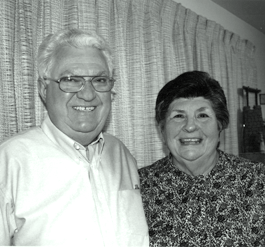 |
how to give away your money
Buddy and Martha Morris answer questions about marriage, ministry, business, and stewardship.
Based on an Interview by Bill and Brenda Evans
Find out more about the Free Will Baptist Foundation at www.fwbgifts.org.
|
MARTHA SAYS SHE LITERALLY "WALKED THE PLANK" to marry her man and has never regretted it. Engaged as seniors in high school, Martha and Buddy Morris married two years later and have spent the past 50 years working together in business and pastoral ministry. We recently sat down to talk with them about their marriage, ministry, business partnership, and their financial goals for the future. They have lived and ministered in Statesboro, Georgia since 1971.
You both mentioned that you work as a team. What do you mean by that?
Buddy: We make decisions together. You sometimes have to compromise, make concessions. Sometimes it’ll go my way; sometimes Martha’s. The question is—what is the best way? That’s what we try to settle on.
Martha: We ran a Christian bookstore together for 34 years. Buddy was the in-store manager running the day-to-day operations. I kept the financial records, ordered books and products, and tracked the inventory.
Buddy: The margin of mark-up is narrow in Christian books, so you have to know what you’re doing financially. I recognized her talent in that area, so that’s why we divided the responsibilities. We’ve made a good team.
How can different abilities or perspectives become strengths in a marriage?
Martha: One of the differences in our background was money. I came from a family that had money available, and Buddy came from a family that didn’t. He vividly remembers the time his parents bought him a bike, but later the storeowner came to reclaim it.
My dad was not a Christian, but he was a wise man. As a sixteen-year-old, he came alone to New York from Beirut, Lebanon. He actually slept on the street at first, had a very hard life. Somehow he got to Savannah, Georgia, met and married my mother, and became a barber. He worked hard and bought properties, but we lived frugally.

I remembering wanting something when I was about 10, and he sat me down to explain why we shouldn’t buy it. He drew up columns on paper and had me write down the figures. In the left column I wrote what our income was. On the right, what we had to pay out. It all made sense to me: just because you have money doesn’t mean you spend it. That was a valuable lesson and the kind of thing I brought into our marriage and our business.
Speaking of business, how did you get started?
Buddy: In 1973 I had breakfast and prayer each Thursday with six or eight Christian men. One day I said, “Let’s pray that someone will open a Christian bookstore here in Statesboro.”
A couple of weeks later, a man in our church said, “I can’t get that bookstore off my mind.” He had it all figured out. He and his wife would make one room of their house available—it had a private entrance. Martha would keep the books. His wife would run the day-to-day things, and he and I would each put up $1,000 to purchase inventory.
Martha, how did you feel about starting a business?
Martha: When Buddy told me the plan, I said, “I don’t have time for a bookstore.” But when he finished college in 1966, I had told him I would go wherever he felt led and do whatever he felt led to do. So there was no argument.
And of course I knew I could do the books. I’d had a lot of on-the-job training in bookkeeping. Plus, math was in my blood. I always say that you just do what makes sense in keeping books. Later when we switched to a computerized system in the bookstore, I wasn’t worried. I knew if it was logical I could do it.
Buddy: So that is how it began. We ordered $1,850 worth of books, the salesman gave us a rack to display them on, and we opened a one-room Christian bookstore in the middle of December 1973. Less than six months later, the other family relocated and we were on our own.
What are some of the special challenges of operating a Christian business?
Buddy: Before I talk about problems, let me just say this: we prayed that the Lord would make the bookstore a good ministry first and then a good business. Also, from the beginning we committed to giving a percentage of the gross income to the Lord—off the top, including sales tax and everything—and we continued that until we sold the business last December.
Martha: We thought we would make money right away, but we worked several
years without taking a salary—put everything right back into the business.
Buddy: And that’s one of the problems—you can’t count on profit right away. In addition to pastoring, I drove school buses, recycled lawn mowers—whatever it took. Another problem is getting customers, and we learned quickly that Christians as a whole don’t shop with Christian businesses. So don't count on that.
Martha: Also we felt accountable to the Lord for what we put into customers hands.
Buddy: We did not stock books from certain publishers or offer products that didn’t match our theological views. That limits your stock and your clientele, but it was our commitment. We did not want to mislead anyone spiritually by what we offered for sale.
Martha: Occasionally, customers would say, “If I can’t pay for it, you ought to give it to me because you are a Christian business.” Even churches would establish accounts yet not keep current—or not pay at all.
So what made it worth it?
 Buddy: One man I won to the Lord in the bookstore told his girlfriend, “If you want to get saved, go down to the Christian bookstore.” So she called me, “Mitch said if I would call you, you would show me how to get saved.” I told her she could come right then or the next afternoon at 4:00 whichever was best. So at 4:00 on a Saturday afternoon here she came, and she got saved. Buddy: One man I won to the Lord in the bookstore told his girlfriend, “If you want to get saved, go down to the Christian bookstore.” So she called me, “Mitch said if I would call you, you would show me how to get saved.” I told her she could come right then or the next afternoon at 4:00 whichever was best. So at 4:00 on a Saturday afternoon here she came, and she got saved.
A gentleman came into the store one day with his family and said, “You don’t remember me, but I got saved here 10 or 15 years ago. Now I’m a deacon in my church.”
One Christmas Eve, we were open late when a family came in. The husband accepted the Lord that night. His wife said to me, “That’s all the Christmas I need.”
Martha: A retired preacher’s wife told me, “You helped raise my children on books we bought here. Now they are raising their kids on those same books.” That makes it all worthwhile.
You’ve sold your bookstore now, and are going to leave your estate to Christian ministries. Why?
Martha: Where did it come from in the first place? We’re just going to give it back. We have always been willing to do whatever it takes. We lived in one room during Buddy’s college years in Nashville. It was tiny. The refrigerator was next to the bed. The bathroom was under the staircase. Now we don’t have to do that, but we still know that God has given us what we have.
Buddy: This is what we’ve worked for. We don’t have children, so we’re giving 100 percent of it to the Lord’s work. We learned to give a long time ago. Early in our marriage we gave our last $20 to a Christian ministry. The very next day, Martha’s boss gave her a raise that amounted to $40 a month.
Do you have a specific estate plan?
Buddy: We have set up a Unitrust with Free Will Baptist Foundation that will ultimately benefit several ministries. Until our deaths, it will also give us an income.
Martha, when you said that you “walked a plank” to marry Buddy. What did you mean?
Martha: The new sanctuary at Savannah FWB Church where we got married was not completed, so there was a deep ditch across the entrance. Someone placed boards over the ditch for me to walk on, so I always say that I walked a plank to marry Buddy. He was worth it!
|

